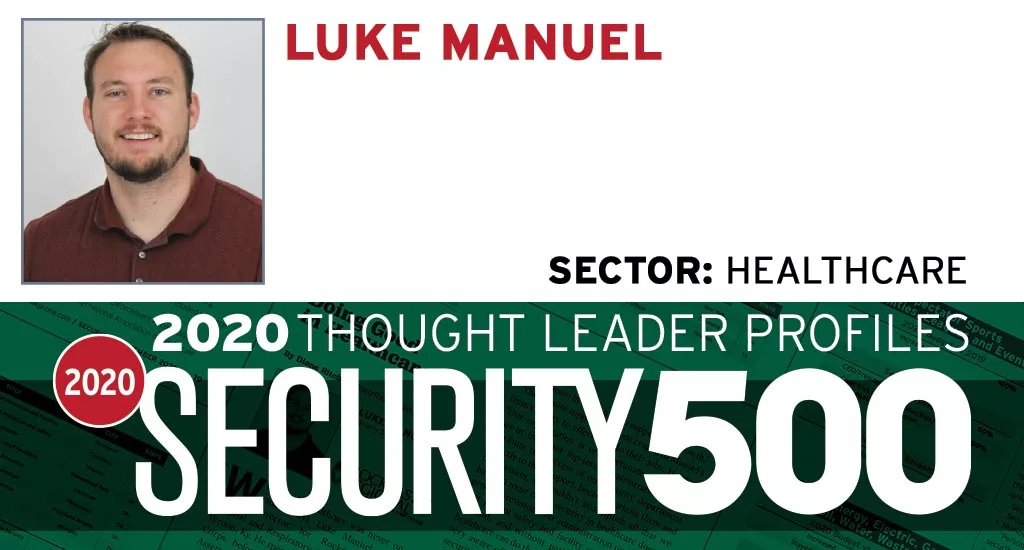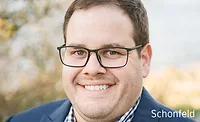Security 500 Thought Leader Profiles
Luke Manuel: Doing Good in Healthcare
Security Director

Working in healthcare was never on my radar,” says Luke Manuel, Security Director for Rockcastle Regional Hospital and Respiratory Care Center in Mount Vernon, Ky. He spent 8 ½ years in the U.S. Marine Corps, before earning his bachelor’s degree in Assets Protection and Security with a focus on critical infrastructure. “I had initially planned to work in the Washington, D.C. area,” he says.
Instead, Manuel learned of a security position at Rockcastle Regional, an acute and long-term care hospital that serves the communities of Rockcastle County, Ky., as well as surrounding counties. The organization is a 26-bed acute care hospital and a 143-bed long-term care ventilator program — the largest of its kind in the nation. The organization also includes a quick care clinic, three rural health clinics, and a medical arts facility with 36 specialty clinics. Manuel and his team of 11 other security officers are responsible for maintaining the security of all the facility.
“Before I was brought on, one security officer covered the entire hospital, per shift,” he shares. “As the hospital continued to grow, our security needs changed, and it became necessary for the expansion of the security team. Our CEO and the board of directors saw a need for a security director and a security team in order to help support that growth.”
The C-suite support has been crucial to Manuel’s team’s ability to effectively do their jobs. He says, “Our organization is very fortunate to have the buy-in from our top-level administration, and I attribute the success of our security department directly to that support, because without them and their vision, we couldn’t accomplish all that we have. In most cases, security in healthcare doesn’t generate revenue. Our administration understands that patient safety and facility security go hand-in-hand, and without patient safety, no one in healthcare can do their jobs. My CEO and CFO are very aware of the good that comes from a strong security department, and they afford us the tools that we need to be successful.”
Manuel is also thankful to the employees that communicate back to him how well his team performs. Annual staff surveys often include positive comments about security and safety efforts, including response times, he says.
“Our response time is a big focus,” Manuel says. “We are no good unless we can get there in a timely manner. Our goal is that officers respond within two minutes of any security notification. Our doctors, nurses and other colleagues need to know they will show up immediately, when needed. And we have accomplished that through training and re-training.” Manuel also uses tools such as incident management software to help track response times.
As with most hospitals, Manuel and his security team deal with upset patients, theft, domestic issues and workplace violence. “Workplace violence is at the top of our risk assessment, as it is with most other health facilities in the United States and globally,” he shares.
“Another challenge for healthcare security is just simply not knowing how the day will play out. Every day is different, and that helps to keep our jobs interesting, but it also presents its own set of challenges. At a moment’s notice, you may be called to help during an emergent code, or deal with an aggressive individual, or it may be to assist with patient monitoring.”
As with most hospitals, COVID-19 has affected how Rockcastle operates. “In our Respiratory Care Center, we have up to 143 long-term care residents who are dependent upon mechanical ventilation to breathe. These are patients with complex medical conditions with multiple comorbidities. They are the most vulnerable of any patient during this pandemic and, as an organization, we have taken every aggressive step possible to keep this virus out of the center. However, this presents its own set of security issues, and we have had to develop ways to protect the security of all those in the center, while still maintaining all social distancing and infection control policies,” he says. “Some of the steps taken were to retrain all security staff on proper use of PPE and relying more heavily on our video surveillance systems.”
One initiative for Manuel and his security team is to improve the hospital’s visitor management system. “It’s worked well for us in terms of shutting off access to certain parts of the hospital, due to COVID-19,” he says. “Our campus is spread out, which means a lot of entry points. We are looking at upgrading some of our security cameras, perhaps with facial recognition, in order to identify problematic individuals, which will help with our visitor management system.”
In his free time, Manuel enjoys spending time with his wife and three daughters. “There is never a dull moment at work and away from work,” he says, “but that’s okay with me. I enjoy my job, and I enjoy spending time with my family, especially with outdoor activities. I also enjoy painting and other artwork because it helps me to unwind and take my mind off things.”
Looking for a reprint of this article?
From high-res PDFs to custom plaques, order your copy today!





